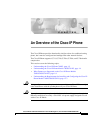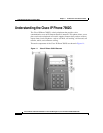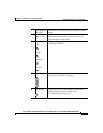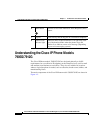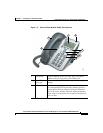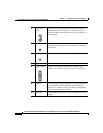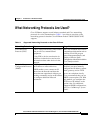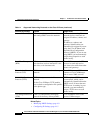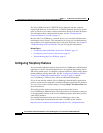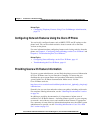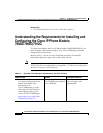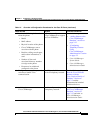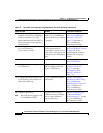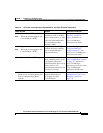
1-9
Cisco IP Phone Administration Guide for Cisco CallManager 3.3, Cisco IP Phones 7902G/7905G/7912G
OL-6313-01
Chapter 1 An Overview of the Cisco IP Phone
What Features are Supported on the Cisco IP Phone Models 7902G/7905G/7912G?
• Configuring TFTP Options, page 4-28
• Understanding Interactions with Other Cisco IP Telephony Products,
page 2-1
• Understanding the Phone Startup Process, page 2-4
What Features are Supported on the Cisco IP Phone
Models 7902G/7905G/7912G?
The Cisco IP Phone models 7902G/7905G/7912G function much like traditional
analog phones, allowing you to place and receive telephone calls.
In addition to traditional telephony features, the Cisco IP Phone includes features
that enable you to administer and monitor the phone as a network device.
This section includes the following topics:
• Feature Overview, page 1-9
• Configuring Telephony Features, page 1-10
• Configuring Network Features Using the Cisco IP Phone, page 1-11
• Providing Users with Feature Information, page 1-11
Feature Overview
Cisco IP Phones provide traditional telephony functionality, such as call
forwarding and transferring, redialing, speed dialing, conference calling, and
voice messaging system access. Cisco IP phones also provide a variety of other
features. For an overview telephony features the Cisco IP Phone models
7902G/7905G/7912G support, and for tips on configuring them, see the
“Configuring Telephony Features Using Cisco CallManager Administration”
section on page 5-2.
Like other network devices, you must configure the Cisco IP Phones to prepare
them to access Cisco CallManager and the rest of the IP network. Using DHCP,
you have fewer settings to modify, but you can choose to assign a static IP if your
network requires it. For instructions on configuring the network settings on the
Cisco IP Phones, see Chapter 4, “Configuring Network Settings on the
Cisco IP Phone.”



